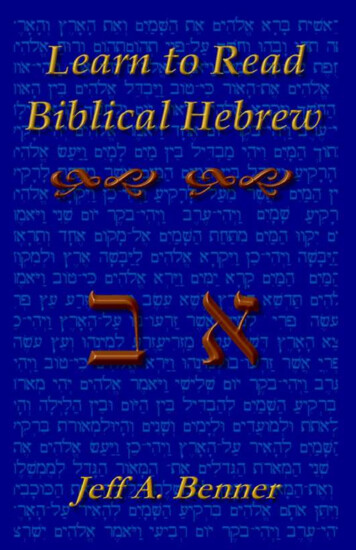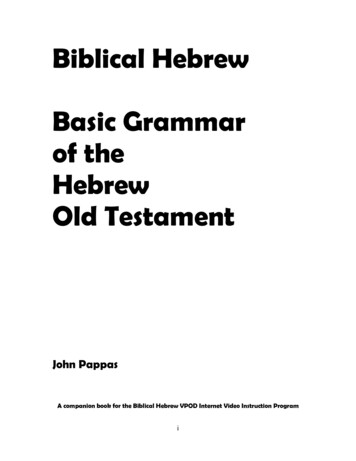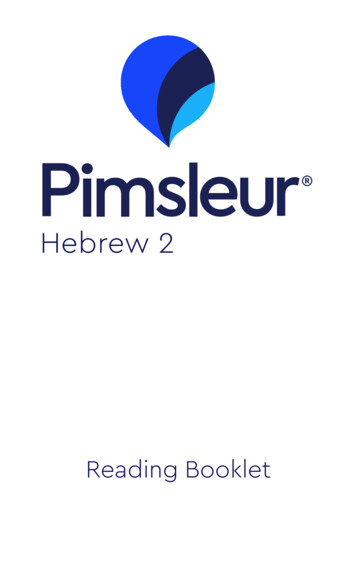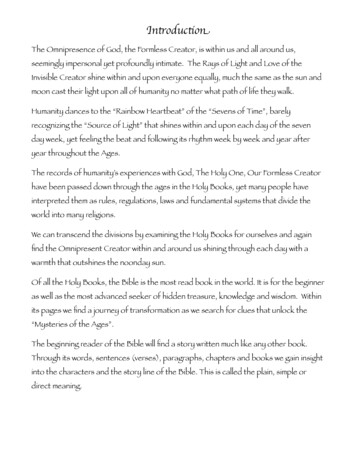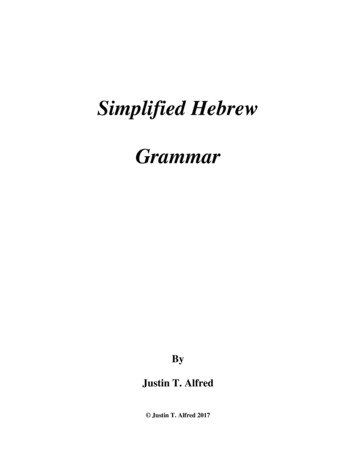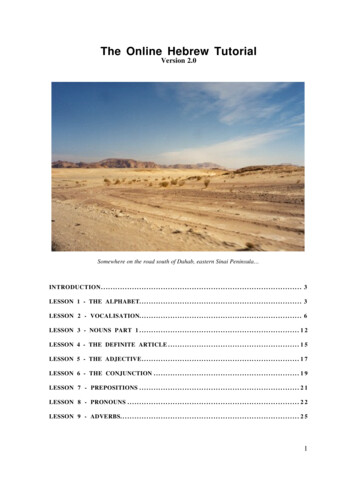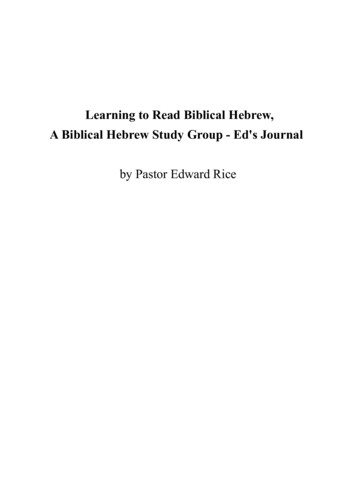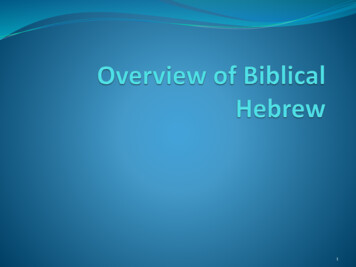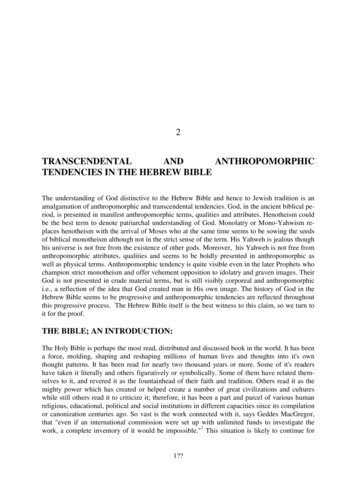
Transcription
2TRANSCENDENTALANDANTHROPOMORPHICTENDENCIES IN THE HEBREW BIBLEThe understanding of God distinctive to the Hebrew Bible and hence to Jewish tradition is anamalgamation of anthropomorphic and transcendental tendencies. God, in the ancient biblical period, is presented in manifest anthropomorphic terms, qualities and attributes. Henotheism couldbe the best term to denote patriarchal understanding of God. Monolatry or Mono-Yahwism replaces henotheism with the arrival of Moses who at the same time seems to be sowing the seedsof biblical monotheism although not in the strict sense of the term. His Yahweh is jealous thoughhis universe is not free from the existence of other gods. Moreover, his Yahweh is not free fromanthropomorphic attributes, qualities and seems to be boldly presented in anthropomorphic aswell as physical terms. Anthropomorphic tendency is quite visible even in the later Prophets whochampion strict monotheism and offer vehement opposition to idolatry and graven images. TheirGod is not presented in crude material terms, but is still visibly corporeal and anthropomorphici.e., a reflection of the idea that God created man in His own image. The history of God in theHebrew Bible seems to be progressive and anthropomorphic tendencies are reflected throughoutthis progressive process. The Hebrew Bible itself is the best witness to this claim, so we turn toit for the proof.THE BIBLE; AN INTRODUCTION:The Holy Bible is perhaps the most read, distributed and discussed book in the world. It has beena force, molding, shaping and reshaping millions of human lives and thoughts into it's ownthought patterns. It has been read for nearly two thousand years or more. Some of it's readershave taken it literally and others figuratively or symbolically. Some of them have related themselves to it, and revered it as the fountainhead of their faith and tradition. Others read it as themighty power which has created or helped create a number of great civilizations and cultureswhile still others read it to criticize it; therefore, it has been a part and parcel of various humanreligious, educational, political and social institutions in different capacities since its compilationor canonization centuries ago. So vast is the work connected with it, says Geddes MacGregor,that "even if an international commission were set up with unlimited funds to investigate thework, a complete inventory of it would be impossible."1 This situation is likely to continue for1?
the centuries because it is the "Holy Scripture" of millions of human beings who believe that init, "the voice of God bursts through every cadence and his finger writes between every line."2They contend that "there is much reason to prognosticate that it's influence is likely to wane onlyto the extent that humanity declines into an era of mass slavery and unreflecting barbarism."3The word "Bible" is derived from the Greek "Biblia" which itself is a "translation of the HebrewSepharim ("books")-the oldest term for biblical literature."4 As a general term it can be used forany book venerated as "Sacred" by it's followers but as a specific term "the Bible" it denotes thebooks which are acknowledged as canonical by the Christian Church.The Bible consists of two main portions: the Old Testament and the New Testament. The OldTestament of the Christian Bible is the Holy Scripture of the Jews who call it the "Hebrew Bible"or just the Bible rather than Old Testament "since that implies a "new" testament"5 based onevents the Jews believe never happened. H. Greenstein observes, that "The basic sacred text ofJudaism is not the "Old Testament". The proper word is simply the Bible, or the Hebrew Bible.The term "Old Testament" is appropriate only for those who believe that the Bible includes a"New Testament" and choose such a distinction to contrast the two major divisions of their sacred text. Since Judaism does not believe in a "New Testament", there is nothing "old" about itsonly testament. That is why it is fitting to call it simply the Bible."6 On the other hand, the Hebrew Bible is "traditionally accepted by Jews and Christians alike as having been divinely inspired and as such, authoritative in shaping their respective faiths and practices." 7The Hebrew Bible or the Jewish Bible differs from the Old Testament of the Catholic Bible inthe number, order of the books and most importantly in excluding the twelve books of Apocrypha which are accepted by the Catholics as canonical and are part of their Bible, however, manyProtestants do not treat the Apocryphal works as canonical so in their case the difference fromthe Hebrew Bible is in the order and number of books.The Jews divide their Bible into three main categories comprising a total of 39 books: the Law orTorah, the Prophets or Neve'im and the Writings or ketuvim. All these three sections are knowncollectively as TaNaK, which is an acronym derived from a combination of the first letters ofeach section in their Hebrew terminology (Torah, Neve'im, and Ketuvim). The Law or Torahcomprises the Chumash ( five ) or the Pentateuch, the five "Books of Moses": Genesis, Exodus,Leviticus, Numbers, Deuteronomy.The "Prophets" fall into two further subdivisions: the "Former Prophets" (four historical books)comprising Joshua, Judges, Samuel (I & II) and Kings (I & II) and the "Latter Prophets" comprising Isaiah, Jeremiah, Ezekiel and "The Books of the Twelve Prophets": Hosea, Nahum, Joel, Habakkuk, Amos, Zephaniah, Obadiah, Haggai, Jonah, Zechariah, Micah, Malachi.The third section "Writing" or "Hagiographa" contains the rest of the books: Psalms, Proverbs,Job, Lamentations, Ecclesiastes, Song of Songs, Ezra-Nehemiah, Chronicles (I & II) Daniel,Ruth and Esther.82?
This threefold division of the Hebrew Bible is "simply a matter of historical development anddoes not, in essence, represent a classification of books according to topical or stylistic categories."9 It is frequently believed to correspond to the three historical stages during which thesebooks received canonical recognition.10 Although all three parts of the Scriptures were believedto be inspired and, as observes G. Foot Moore, "had the verity and authorship of the word ofGod",11 their significance and authority was determined by their respective positions in this tripartite division. Since the Pentateuch with it's author Moses was thought to be the fountainheadof the rest of books, then "the prophets are transmitters of a continuous tradition beginning withMoses; the Prophets and the Hagiographa explain the Pentateuch. Thus all the rest of books, withno detraction from their divine inspiration and authority, are an authority of the second rank; theyrepeat, reinforce, amplify, and explain the Law, but are never independent of it."12 In view of thisconspicuous position of the Torah it is pertinent to discuss the status and authority of the "Law"or "Pentateuch" in Jewish tradition.THE "LAW" OR THE "TORAH", SIGNIFICANCE AND AUTHORITY:The term "Torah" separates the Pentateuch from the other two sections of the Hebrew Bible. Itmeans "teaching", "doctrine", or "instruction"13 and is often used to refer to all the body of laws.The term in a wider sense is also "applied to Scriptures as a whole and to biblical legislation incontradiction to rabbinical enactments."14The Torah is the most important and authoritative book in Jewish faith. It received this recognition from Numbers 8:1 " And the Lord spake unto Moses " and also from Deuteronomy 31:9 "And Moses wrote this law ". (see also Ex. 20:1, 32:16, Lev. 1:1, 4:1, Num. 1:1, 2:1, etc.) In viewof it's divine origin and Mosaic authorship,15 the Torah has been held in great esteem throughoutJewish history. The Rabbinical tradition declared it to exist even prior to it's revelation to Moses.The Torah, the Rabbis said, "existed in heaven not only before God revealed it to Moses, buteven before the world was created."16 It was one of those six or seven things that were createdbefore the creation of any thing in the world and it even " preceded the throne of glory."17 The"Torah which God had kept by him in heaven for nine hundred and seventy-four generations wasa hidden treasure."18 God consulted the Torah in regard to the creation of the world: "I was theinstrument of the Holy One, praised be He." "It is the way of the world that when a mortal kingbuilds a palace, he builds it not from his own plans but with the advice of an architect. And thearchitect in turn has blueprints and charts to guide him how to construct the rooms and chambers.So, too, the Holy One, praised be He, was guided by the Torah in creating the world."19It is evident from these quotations that Rabbinic Judaism had a strong belief in the Torah beingthe preexistent "Word of God" given to Moses in a mode of direct revelation. They also had nodoubt whatsoever about the physical Mosaic authorship of the Torah, "And who wrote them?Moses wrote his own book (The Torah) and the sections concerning Balaam and Job."20 OttoEissfeldt summarizes the point in the following words: "Moses was from an early date regardedas the compiler, or more correctly as the mediator, of the laws of the Pentateuch which issuedfrom God himself. The name used in the New Testament clearly with reference to the whole Pentateuch-the Book of Moses-is certainly to be understood as meaning that Moses was the compilerof the Pentateuch. Explicit references to this conception may be found in Philo., in Josephus,3?
and in the Talmud (bab. Baba Batra 14b), where it is said that Moses wrote the five books namedafter him. Philo and Josephus explicitly attribute to Moses also the conclusion which relates hisdeath.(Deut. xxxiv, 5-12), whereas the Talmud regards this as having been written by Joshua.The Jewish tradition concerning the compilation of the Pentateuch was taken over by the Christian church."21 In addition to that, the Rabbinic sources contended that God's whole revelationwas not comprised in the written Torah but also in the Oral Torah, the Talmud, which Moses received side by side with the Written Torah on Sinai and which was orally carried and conveyedthrough subsequent generations.22The medieval Jewish scholars maintained the same position vis-a-vis the divine provenance ofthe Torah and the resulting authoritative and binding nature of the Bible in general and the DualTorah in particular. There is a popular saying about Moses Maimonides ( 1135-1204 ) that "fromMoses to Moses there was none like Moses".23 This medieval philosopher argued in his introduction to "Mishna Torah" that, "All the precepts which Moses received on Sinai were given together with their interpretation, as it is said, "And I will give to you the table of stone, and thelaw, and the commandment "(Ex. 24:12) "The Law" refers to the Written Law: "the commandments" to its interpretation. This commandment refers to that which is called the Oral Law. Thewhole of the Law was written by Moses, our Teacher, before his death in his own hand."24 In hisletter to Joseph Ibn Gabir, he declared that "the Torah in it's totality has been given to us by theLord Through Moses."25 This greatest of Jewish scholars of the Middle Ages formulated "Thirteen Principles" which a Jew must believe in order to be a Jew. The Eighth Fundamental Principle is comprised of the following words: "that the Torah came from God. We are to believe thatthe whole Torah was given us through Moses, our Teacher, entirely from God. When we call theTorah "God's Word" we speak metaphorically. We do not know exactly how it reached us, butonly that it came to us through Moses who acted like a secretary taking dictation. He wrote downthe events of the time and the commandments, for which reason he is called "Lawgiver.""26 ToMaimonides, the entire Hebrew Bible was the inerrant Word of God. He argued: "There is nodistinction between a verse of Scripture like "The sons of Ham were Cush and Mizraim" (Gen.10:6), or "His Wife's name was Mehatable and his concubine was Timna" (Gen. 36:39, 12) andone like "I am the Lord your God" (Ex. 20:2) or "Hear, O Israel" (Deut. 6:4). All came from God,and all are the Torah of God, perfect, pure, holy, and true. Any one who says Moses wrote somepassages on his own is regarded by our sages as an atheist or worst kind of heretic, because hetries to distinguish essence from accident in Torah. Such a heretic claims that some historicalpassages or stories are trivial inventions of Moses and not Divine Revelation."27These words are so clear and forceful as to speak for themselves. Jews in the Middle Ages had astrong belief in the divine origin and Mosaic authorship of the entire Torah and in it's infallibility, immutability, and eternity. This "Law would neither be abolished nor changed or substitutedfor some thing other than it,"28 was their axiom. Their belief in its infallibility, supernatural origin and permanent credibility was so deep in the hearts of medieval Jewish scholars that theyclosed all the doors and denied all the possibilities of progressive revelation. They held withMaimonides that "it will neither be abrogated nor superseded, neither supplemented norabridged. Never shall it be supplanted by another divine revelation containing positive and negative duties."29 They also maintained, as Maimonides observed, that "To the Torah, Oral and Written, nothing must be added nor any thing taken from it." 304?
This view was maintained by the Jews till the "beginning of our era"31 Even in the present dayworld of scientific naturalism and cosmic pessimism, this is what a reformed Jew says about thesignificance of the Torah, "The teachings of the Torah are the most sacred legacy and inspirationof the Jewish people. They are so fundamental that they are recited in public reading every weekof every year. The five books are divided into segments or portions, one of which is to be readon each successive Sabbath. Usually, the first words of each portion are chosen as the ti
TENDENCIES IN THE HEBREW BIBLE The understanding of God distinctive to the Hebrew Bible and hence to Jewish tradition is an amalgamation of anthropomorphic and transcendental tendencies. God, in the ancient biblical pe-riod, is presented in manifest anthropomorphic terms, qualities and attributes. Henotheism could be the best term to denote patriarchal understanding of God. Monolatry

